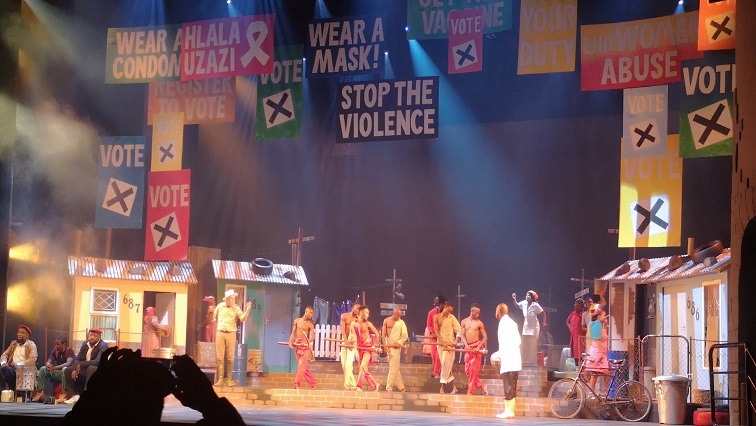The launch of the theatre production “Harken Lalela 1976 -The Musical” at Durban’s Playhouse has attracted art lovers from all walks of life.
The story centres around a millennial, Nkululeko who initially does not want to vote and then gets to know about the history of the struggle and the killing of young people in 1976.
The youth uprising of 16 June 1976 marked a turning point in the country’s socio-political landscape. In commemoration of the Soweto uprising, renowned theatre producer, Jerry Pooe says the play aims to teach the youth that the future is in their hands.
“The message I am trying to get through to the young people is that the future is in their hands. They mustn’t always blame the politics of the day, they must do something about it.
“So, that is why I always remind them that destiny is in their hands. We are doing it through a boy that is refusing to go to the mountain. But that is a metaphor for actually getting involved in what is happening in your life, your society, in your community so that you can have a purpose. And then it is you who can bring change from what is happening,” explains Pooe.
The play tells the story of SA’s struggle before democracy:
#sabcnews #sabckzn The launch of the theatre production "Harken Lalela 1976, the musical at the Durban's Playhouse attracted arts lovers from all walks of life. pic.twitter.com/ZxkRu2Kces
— Nonkululeko Hlophe (@Leko3) June 6, 2021
‘Seek knowledge about history’
Aspirant actor Mthobisi Khanyile, who plays lead character Nkululeko, says there are many lessons the youth can take from the play. This includes learning to seek knowledge about the history of their country.
“I’m representing the anger of every single person who is a youth in South Africa in each and every corner. I think each and every problem has a solution, it depends on how you decide to look at the problems. For example, Nkululeko is facing the problem of being negative about everything, about the system. It took him just to give it time and look at the other side of the situation, so that he can find something good about voting, about the state, about government, about everything. It taught me not to look at anything from one side.”
Youth of 1976
The family of Hector Pieterson attended the premiere of the play. The play centres around what happened to the youth of 1976 with a touch of how today’s young people view life around them.
Pieterson’s sister, Antoinette Sithole, who was also at the 1976 march where her 10-year old brother was shot dead, says young people back then wanted to be heard and that there was no need for police brutality. Sithole says she still remembers vividly what happened.
“I still feel like it happened yesterday and I am recalling what was happening during the 1976 era. Actually, I was very angry because we were just conveying the message, we never thought things will turn out the way they did and besides we were youngsters. We were not fighting anyone, we were just conveying our message so that we can be heard. Yes, we knew that we were oppressed but when police fired at us then I was very angry and devastated. We were young, we just needed to be heard, not for them to kill us. They should have resorted to something better.”
#sabcnews #sabckzn Snippet video of the Harken Lalela 1976 the musical opening in Durban's Playhouse last night. pic.twitter.com/A53iZl6AaC
— Nonkululeko Hlophe (@Leko3) June 6, 2021
Struggle songs
The music in the play also evoked memories for the older generations through struggle songs. The musical features household names such as Melusi Yeni, popularly known for his roles in TV soapies Generations and Imbewu: The Seed.
“I think what excited me now is that we are telling the story to the young ones. More so your 2000s, the young guys who know very little about where we come from in this country with the struggle; to be able to take the day and introduce it to these people the way we are able to do it. For me, it just spoke exactly what I needed.
“Also what I like is that Bra Jerry, who wrote and directed the piece, went as far as to research people who were actually part and parcel of June 16, who were there, people who got shot at, so it just gave the story substance that we took actual cases of people who had issues around that same day. It is quite a powerful story. Every year, we are reminded as young people to be responsible and patriotic South Africans.”
Seventy percent of the production cast and staff are female and almost the entire cast is made up of young people. The musical is expected to tour South African theatres later in the year.






